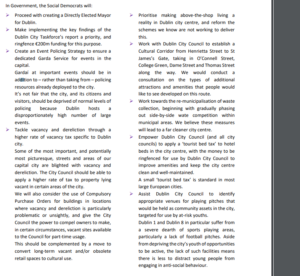The Social Democrats head into the November 29th election off the back of strong local election results in Dublin, becoming the 2nd largest party on Dublin City Council with 10 councillors.
Current polling indicates the party might end up playing a role similar to the Greens in the 2020 general election and as such have been eyed up as potential coalition partners.
The party has revealed their demands for going into government; a seat at Cabinet and the role of Minister for Disability, building 50,000 affordable purchase homes, a full implementation of Sláintecare, agreeing to the party’s climate targets, a plan to reach our climate targets and avoid €8 billion in fines and making Ireland’s childcare service a “high-quality and public,” one.
The preamble to the 150 document reads “we want to play a pivotal part in the next government. We want to be in government to make a difference, not just to make up the numbers. We are not interested in ‘jobs for the boys’ – we want to do the job right!”
Dublin features heavily in the party’s manifesto, with 2 of the party’s 6 current TDs (interim leader Cian O’Callaghan of Dublin Bay North and Gary Gannon of Dublin Central) being Dublin-based.
The party says that building the Metrolink is important to them, and would commission an independent study to see if expanding the line to South-West Dublin is feasible.
Page 103 of the manifesto specifically focuses on the party’s plan for Dublin City, which can be read below:

The Social Democrats’ plans for Dublin City
The party also goes into the weeds on reforming local government, calling for an overhaul of Ireland’s system of local government.
With Labour’s manifesto calling for to re-establishment of town councils, the Social Democrats are advocating for a re-establishment of Municipal Districts as Municipal Councils, “with councillors elected to sit on them within their own area, as well as on the local authority’s council.”
Local Government funding is highly centralised and, as currently structured, disadvantages several counties unduly, citing Fingal as an example
“It is clear that the current funding distribution system does not adequately provide for areas with rising populations. This is visible in everything from local authority staff numbers to the provision of amenities like municipal swimming pools. In other policy areas it is also evident in Garda numbers and school class sizes.”
June’s local election results showed potential for the Social Democrats to compete with Sinn Féin for left-wing votes and enjoy support from People Before Profit on transfers.
To that end, the party has called for a wealth tax on millionaires, as well as a tax on “super wealth.”
It is our goal to tax ‘excess wealth’ or ‘super wealth’, rather than what might be viewed as ordinary household wealth,” the manifesto reads.
“For this reason, the family home (to a value of €2 million) would be exempt from calculations of the tax liability, as would family businesses, agricultural land and so on. The tax would have a high tax-free allowance to avoid an excessive burden on low-income people with high value assets.”
They would create a levy of 0.5 per cent on assets over €1 million, and 1% on assets over €2 million.
With fears of Donald Trump’s tariff wars with Europe, the Social Democrats have proposed bringing in an “exit tax”.
“It may be necessary to enforce an ‘exit tax’ —a one-off tax on individuals if they decide to move out of the country for tax purposes. For example, the United States has an exit tax to deter expatriation by individuals with over US$2 million in net worth. Individuals renouncing their citizenship are required to pay tax on all their unrealised capital gains,” the document reads.
“It is time that the people who have benefited the most from the current economic model pay a modest contribution from the massive wealth they hold. We often hear the case against wealth taxes in terms of feasibility – but it’s increasingly a question of political will. Given today’s level of inequality, it is not radical but
sensible to be discussing fair wealth taxation if we are to create a fairer society.”
On social issues, the party pledges to make Ireland “the number one place in Europe for LGBTI+ people,” with Ireland currently ranking in 15th place.
On immigration, the party said “having previously been a country of mass emigration for so many generations, we are now a country of sustained inward migration. Our migration policies should reflect this history, and the effects of the most recent changes, and should acknowledge the benefits – cultural, social and economic – that immigration brings to Ireland, whilst also preparing us for the various challenges migration can bring.”
“The Social Democrats want to see a fair system, in which people seeking protection are treated humanely and decisions are made quickly; a rules-based system where the rules are enforced,” they said.
“People coming to Ireland seeking protection deserve a fair hearing, dignity in the process, and a swift decision In government , we will build a robust State-run international protection system which processes people’s claims
efficiently and treats them humanely during a reasonable waiting period,” while also criticise the current “over-reliance on private provision of accommodation for migrants.”
The party has pledged an end to conversion practices, improving access to trans healthcare, and introducing a second National LGBTQI+ Inclusion Strategy, which was in the Programme for Government in 2020.
On work issues, the party has said they “recognise” that remote work has the potential to unlock positive social, economic, and environmental change for the communities of Ireland, and work to unlock these benefits for Ireland.”
In terms of referendums, the party has called referendums to be held on the right to housing, public water ownership, and “possibly” a referendum on securing Ireland’s right to the Triple Lock system.
The full manifesto can be read here.